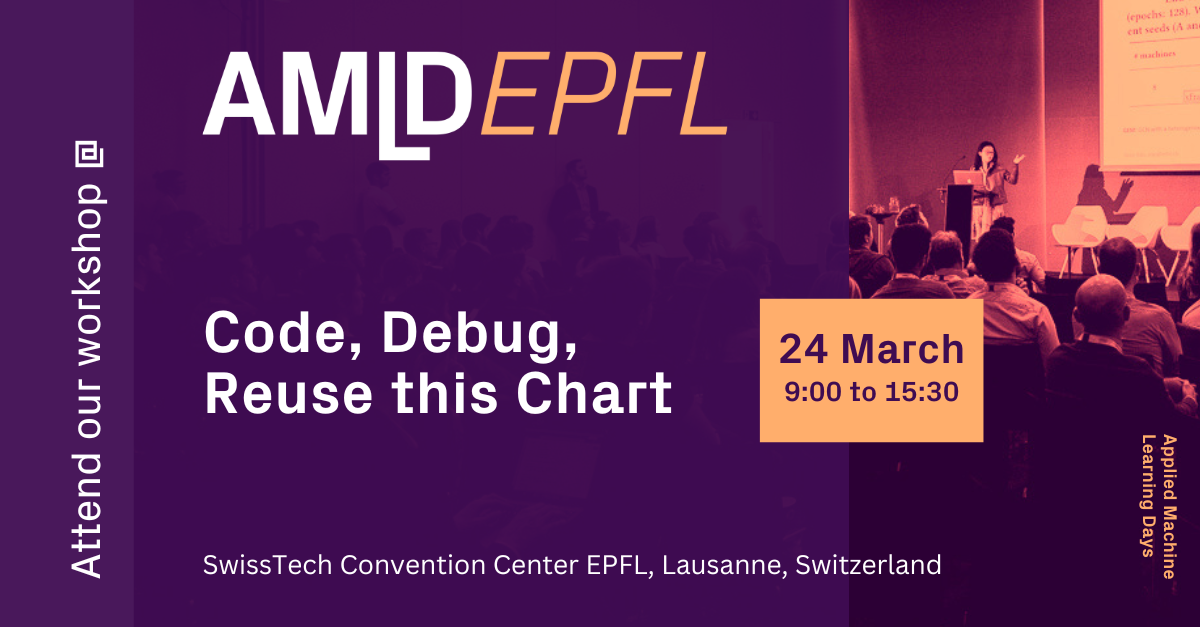"Code, debug, reuse this chart" will take place on 24th of March 2024 at 09:00 at Applied Machine Learning Days 2024 in Lausanne, Switzerland.
You can install the materials for the workshop from PyPI:
$ python3.12 -m venv .venv
$ souce .venv/bin/activate
$ python -m pip install chartcrafthubThe workshop materials are created with Python3.12.
To start the workshop, just import the chartcrafthub package and follow the instructions:
(.venv) ~/d/K/ChartCraftHub ❯❯❯ python -m chartcrafthub
_____ _ _ _____ __ _ _ _ _
/ __ \ | | | / __ \ / _| | | | | | | |
| / \/ |__ __ _ _ __| |_ | / \/_ __ __ _| |_| |_ | |_| |_ _| |__
| | | '_ \ / _` | '__| __| | | | '__/ _` | _| __| | _ | | | | '_ \
| \__/\ | | | (_| | | | |_ | \__/\ | | (_| | | | |_ | | | | |_| | |_) |
\____/_| |_|\__,_|_| \__| \____/_| \__,_|_| \__| \_| |_/\__,_|_.__/
Thanks for attending "Code, debug, reuse this chart" workshop!
In this workshop, you'll learn how to:
✓ Craft visually compelling figures that enhance your document's overall appearance.
✓ Develop modular plotting functions utilizing matplotlib.
✓ Utilize Rich and debugging and method exploration.
✓ Organize your code for enhanced usability.
✓ Package your code for seamless portability.
To begin, visit the documentation home page: https://kislovskiy.github.io/ChartCraftHub/]
- Artem
Copy the great architectures. Edward Tufte
There are three ways to follow this tutorial:
- Dev Containers if you have Docker and Visual Studio Code installed
- GitHub Codespaces if you don't want to install anything on your local machine
- Local installation if you are a fan of local development.
We recommend using Dev Containers or GitHub Codespaces to avoid any issues with the environment setup.
To use it, you need to have Docker and Visual Studio Code installed. This project is configured to use devcontainer for development.
First, we need to install the Remote - Containers extension in VS Code. Then, open the project in VSCode and click on the green button in the bottom right corner of the window. This will open a new window in a container with all the necessary tools installed. It could take a few minutes to build the container for the first time.
Once the container is running, you'll see green "Dev Container" badge in the bottom left corner of the VSCode window. The development environment is ready to use. Since Docker provides an isolated environment, we don't need to create a virtual environment or install any dependencies on the host machine.
If you don't want to install anything on your local machine, you could use GitHub Codespaces throughout this tutorial. To use it, you need to have a GitHub account and a repository forked to your account. After that, you could open the repository in GitHub and click on the "Code" button in the top right corner of the page. Then, select "Open with Codespaces" from the dropdown menu. It could take a few minutes to create the environment for the first time.
Once the environment is ready, you'll see a new tab in your browser with the VSCode editor. The development environment is ready to use.
If you prefer to use your local machine, you need to have Python 3.12 installed. Create a virtual environment and install the dependencies:
$ python3 -m pip venv .venv
$ source .venv/bin/activate
$ make install
